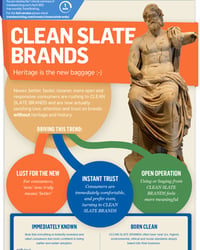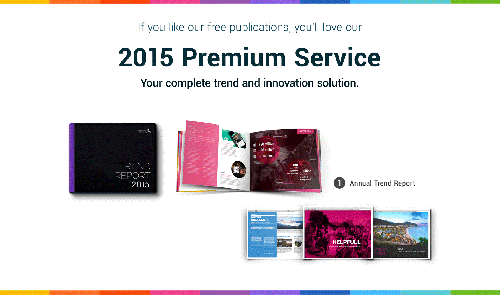April 2013 Trend Briefing:
CLEAN SLATE BRANDS
Heritage is the new baggage ;-)
About trendwatching.com
260,000 subscribers and 1,200+ clients turn to trendwatching.com for global consumer trend intelligence.
We've been scanning the globe for consumer trends, insights and innovations since 2002. We report on our findings in our free Monthly Trend Briefings and Region-specific Trend Bulletins, while leading brands and agencies, small and big, also enjoy access to Premium, our full trend service.
We rely on teams and representatives in London, São Paulo, Singapore, New York, Sydney and Lagos, and run a network of 2,600+ spotters in 100+ countries. More »
Subscribe to our Trend Briefings
For Journalists
If you are working on a story about trends for 2015, then please feel free to publish part or all of our trends. Our only requirement is that you credit trendwatching.com.
Or do email Victoria Loomes, who will connect you to the best person in our team for an exclusive comment/ quote; we'll try to make your deadline-dominated life easier!
Our 2015 Premium Service
your complete trend & innovation solution
In addition to our monthly briefings, we also offer our 2015 Premium Service: a full, 'have to have' trend service, which includes access to our 2015 Trend Report, Trend Framework, Innovations Database, Industry Updates, and an Apply Toolkit.
Hundreds of (big &small) brands and agencies around the world already have access. Can you afford to miss out? »
Our other free publications
Article tools
There's a profound shift in power taking place in the business arena. With a whole new breed of exceptional new brands living by the rules of Business 3.0, consumers are now attracted to unproven and unknown brands the way they were attracted to established brands in the past. In fact, 'established' is now often just another word for tired if not tainted. The future belongs to CLEAN SLATE BRANDS.
CLEAN SLATE BRANDS:
Newer, better, faster, cleaner, more open and responsive; consumers are rushing to CLEAN SLATE BRANDS and are now lavishing love, attention and trust on brands without heritage and history.
Driving this trend:
1. LUST FOR THE NEW
Why for consumers, ‘new’ now truly means ‘better’
As we highlighted in NEWISM, the consumer arena has never been more fixated on the ‘new’. Thanks to the democratization and globalization of innovation (not to mention the celebration of entrepreneurship), brands and individuals from all corners of the world are now working around the clock to dream up and launch endless new products and services, that are truly better and more exciting than current offerings. Lower barriers to entry has gone from buzzphrase to reality, especially online.
And to underscore the 'for and by' element of the democratization of innovation, new players are by default more nimble and laser-focused on what consumers want now (as opposed to yesterday) than the bigger legacy-laden brands they compete with.
So from being something that was pushed to consumers by businesses (‘new and improved’), the ‘new’ is now subject to an increasingly strong pull from consumers. Excited by positive experiences of a ‘new’ that is genuinely ‘better’, consumers are hungry for more.
The whole concept of ‘brands’ rests on the idea that consumers need recognizable, trusted symbols, honed over many years, to help them navigate the wealth of available choices. However this idea is being swept aside in a business arena* now characterized by INSTANT TRUST.
* This trend is most relevant in mature economies, where trust in big business has never been lower: only 28% trust big business in the UK, 30% in Japan, 32% in Australia, 33% in the US and 34% in Canada. In emerging markets however, consumers' trust levels are much higher: 83% in China, 72% in Turkey, 65% in Brazil and India (Havas, January 2013). The question is: will big business maintain this trust?
Four forces are making consumers immediately comfortable with (and even prefer) turning to CLEAN SLATE BRANDS:
IMMEDIATELY KNOWN:
Now that experiences are increasingly shared, and even the newest of the new is instantly reviewed and rated, consumers have THE F-FACTOR, and feel more confident in being earlier and earlier adopters.
92% trust recommendations from friends and family above all other forms of advertising, up 18% since 2007. Online consumer reviews are the second most trusted source of brand information with a 70% trust rating, up 15% since 2008. Television ads were trusted by only 47%, down 24% since 2009.
(Nielsen, April 2012)
BORN CLEAN:
CLEAN SLATE BRANDS better reflect the zeitgeist. The fact that they are (by definition) newly established, means that they often have ‘new’ business values – such as higher environmental, ethical and social standards – deeply baked into their business models and practices. Just witness how the values of local, storied, sustainable, progressive new businesses have been consistently appropriated by big businesses, as they stumble to catch up here.
The average age of brands in Millward Brown’s BrandZ Top 100 Global Brands Report has fallen consistently, from 84 in 2006 to 68 in 2012.
(Millward Brown, May 2012)
SIMPLE TRUTH:
CLEAN SLATE BRANDS’ simple, lean operations (everything from fair labor practices, transparent supply chains and clean design) are easily understandable – and therefore trusted – by consumers. And with scandal after scandal (from financial products to horsemeat) being blamed on excess 'complexity', who can blame them?
Brands that simplify customer decision-making are 115% more likely to be recommended.
(Corporate Executive Board, May 2012)
FUTURE FAITH:
Business practices are now totally transparent (and if not, merely waiting to be exposed). CLEAN SLATE BRANDS know this. Consumers know that CLEAN SLATE BRANDS know this. Which explains why, on top of the fact that CLEAN SLATE BRANDS, almost by definition, cannot have sinned yet (they've just started, after all), consumers trust them to act correctly in the future too.
64% of global consumers think most companies are trying to be responsible only to improve their image.
(Havas Media, 2011)
Or, to put it another way, many ‘old’ brands were set up in the era of industrial capitalism, when secrecy was a source of competitive advantage and shareholders encouraged pursuit of profit at any cost. Now the world has changed, but even older brands that want to reposition themselves have a hard time wrestling with internal fiefdoms, convoluted legacy systems and opaque supply chains (something that many big company readers of our Trend Briefings might have first hand experience of ;-).
3. OPEN OPERATION
Why using or buying from CLEAN SLATE BRANDS feels more meaningful
CLEAN SLATE BRANDS are natives in a land where communication with brands is two-way, participatory and less reverential, and as such can connect with consumers in a way that older brands often struggle to.
Whether it’s through offering financial support, by helping to shape a brand’s operations, or even by contributing to the product itself (see the Lockitron, Coffee Joulies and Waze examples below), customers of CLEAN SLATE BRANDS often feel more in control – a basic human desire – and that they have a meaningful relationship with the brand*.
* Yes, we too hate the idea that all consumers want to ‘have a relationship’ with any brand they buy from ;-) There are many purchases that are, and will remain, purely functional. But even in traditionally ‘low involvement’ categories such as domestic care, CLEAN SLATE BRANDS with strong stories and identities can thrive. Witness for example how Method’s design-led, eco-friendly products succeeded against P&G’s and Unilever’s.
Examples of CLEAN SLATE BRANDS that are making waves »
Consumers have always been attracted to local, authentic food and beverage brands. Here are just a couple of recent innovative examples:
Coffee Joulies: US-based company lets consumers decide whether to move manufacturing to China
In December 2012, the creators of Coffee Joulies (a product which keeps hot beverages hotter for longer) asked customers to vote to determine whether or not the brand should move production from an American factory to a less costly Chinese one. Consumers could help decide on the location of manufacturing by making a purchase using either a USA or China coupon code. To reflect the lower costs of Chinese manufacturing, the discount using the China coupon was USD 10, while the one for the USA was only USD 5.
Wewi: Brazil’s first ever organic soda is made with Amazonian guarana
Launched in September 2012, Wewi is the first ever organic soda to be produced in Brazil. The low calorie soft drink is made from 100% organic Amazonian guarana, organic sugar and carbonated water, and is free of artificial flavorings and preservatives.
Transport is just one industry seeing the emergence of CLEAN SLATE BRANDS:
W Motors: Luxury sports car developed in the Middle East
No, CLEAN SLATE BRANDS won't always be cleaner or more progressive (unfortunately). In January 2013, Beirut-based W Motors unveiled the HyperSport at the Qatar Motor Show. With a 750 horsepower engine, the HyperSport is capable of a top speed of 240mph, and is priced at USD 3.4 million. The brand (which is the first luxury sports car brand from the Arab region), planned to produce only seven units of the ‘hypercar’, however over 100 orders were received in the week after the car was launched. A signal that ultra-wealthy consumers will spend serious money on a CLEAN SLATE BRAND with no history or heritage, even if that involves delivering a resounding 'fuck you' to any eco-concerns :-(
Waze: Crowd-sourced navigation app grows from 10 million to 36 million users during 2012
For an example of how consumers will often offer more information to CLEAN SLATE BRANDS, look no further than Israel-based Waze, a smartphone traffic & navigation app that works by users disclosing their personal information to form community edited maps. Far from causing an outcry from users, in 2012 Waze grew its user base from 10 million to 36 million. One reason is that this sharing contributes to a better product: maps are constantly updated and incorporate ‘real time’ changes through user data. Waze also has a social aspect, with users able to sync with other drivers to share information on traffic issues and gas prices.
Convenience-loving consumers are embracing products and services that make their domestic lives easier, even trusting the security of their homes to CLEAN SLATE BRANDS:
Lockitron: Home security via smartphone app
Lockitron is a device and app that allows users to lock, unlock and share access to their front door remotely through their mobile phone. Initially rejected by Kickstarter, Lockitron formed its own crowdfunding campaign to raise funds through pre-orders. The initial goal of USD 150,000 was hit within 24 hours, and five days after launching the company had raised USD 1.5 million, with reservations exceeding 1,000% of the original target.
SmartThings: Control of objects around the home via mobile app
In September 2012, SmartThings raised over USD 1.2 million on Kickstarter. SmartThings allows users to connect physical objects to the internet, enabling them to monitor and control doors, televisions, air conditioning, lights, heaters and more remotely via a smartphone app, and to receive notifications when people or pets enter or leave their home. SmartThings retail kits start at USD 299.
CLEAN SLATE BRANDS are disrupting the personal finance industry, persuading consumers to hand over their financial data (if not actual cash) to services that promise more than incumbents:
Simple: Digital banking start-up focused on customer service builds a waiting list of over 125,000
Simple offers its users simplified and accessible banking through online and mobile apps. Despite not having the heritage and physical presence of a traditional bank, Simple launched its first full release in July 2012, working through the 125,000 customer waiting list that it had built since its launch was announced in 2010.
TransferWise: Crowd-sourced currency exchange undercuts banks
UK-based TransferWise is a service that connects consumers seeking to exchange GBP and EUR (and since November 2012 USD), and avoid bank service fees, high commissions and/ or poor rates. Currencies are exchanged according to the common mid-market rate as reported by worldwide currency markets, rather than traditional retail bank rates, which are usually much worse. Since the company launched in January 2011, users have exchanged over EUR 10 million and saved more than EUR 500,000 in the process.
In the tech world, the dizzying pace of change means that one moment’s CLEAN SLATE BRAND can quickly be overtaken by the next:
2go: South African mobile messenger service beating Facebook in Nigeria
South African social messenging app 2go saw continued strong user growth in 2012. Indeed in Nigeria, the service is pushing out Facebook (with over 10 million users, while Facebook has 5 million). The number of Facebook users in Nigeria was reported to have dropped by over 300,000 between November 2012 and January 2013, while 2go claimed to be adding 50,000 new registrations a day.
Snapchat: Temporary photo sharing app sees explosive growth
Snapchat is an app that enables users to share images that can only be viewed by the recipient for a few seconds before they ‘self-destruct’. The developers announced in October 2012 that the service was processing 20 million images a day, by December this had risen to 50 million per day; in contrast to the limited success achieved by Facebook’s similar ‘Poke’ application.
Even in health, where consumers might be expected to be extra mindful about dealing with CLEAN SLATE BRANDS, upstarts are making waves:
23andMe: Personal genetics company targets 1 million customers
The ‘personal genetics’ DNA testing company 23andMe announced in December 2012 that it had raised USD 50 million and was aiming to expand its genotyping to 1 million customers, up from the 180,000 it had profiled to date.
Non-profits and social businesses are not exempt from the CLEAN SLATE BRAND phenomenon. Just one example:
Who Gives A Crap: Toilet paper brand donates profits to help build toilets in the developing world
Who Gives a Crap is a brand of toilet paper from Australia which donates 50% of its profits to help build toilets in the developing world. The brand reached its target on crowdfunding site Indiegogo in August 2012, raising USD 50,000 in 50 hours. A 24 pack of rolls is priced at USD 20. Proof that there's room for CLEAN SLATE BRANDS in even the most staid and 'mature' industries ;-)
“CLEAN SLATE BRANDS often have ‘new’ business values - such as higher environmental, ethical and social standards - deeply baked into their business models and practices.”
IMPLICATIONS and OPPORTUNITIES:
First, let's get one thing straight. The CLEAN SLATE BRAND trend won't wipe out all desire for brands with history and heritage. There will still be some consumers, at least some of the time, who will want to turn to established, proven products from trusted, well-respected brands. Or lust after illustrious brands that go back decades if not centuries. Remember, no trend ever applies to all consumers, all of the time.
But CLEAN SLATE BRANDS is a trend driven by a profound shift in consumer preferences, and as such should get entrepreneur‘s juices going, while at the same time making switched on business professionals instantly question the attitude, tone, structure and approach of their brand.
And while the ranks of CLEAN SLATE BRANDS might be filled with innovative small businesses and fresh start-ups, the characteristics behind successful CLEAN SLATE BRANDS can be adopted by any brand, including old, big ones:
- Learn from the excitement of CLEAN SLATE BRANDS and seize the opportunity to do things differently. Think new products (such as Nike’s revolutionary super-sustainable Flyknit running shoe), or even whole new business ventures (such as Kenyan mobile operator Safaricom’s M-Shwari savings service).
- Reduce complexity: Take a leaf from BMW’s ‘We Only Make One Thing. The Ultimate Driving Machine.’ campaign, or pare back bloated product portfolios and company structures. Bring clarity and speed to internal decision-making, and watch as consumers find it easier to understand everything about your brand.
- Bake in responsibility: Witness how even established brands such as Patagonia attempt to keep their slate clean with high-profile commitments to sustainability (such as the brand’s Footprint Chronicles initiative).
- Speak with an authentic voice and have something interesting to say, and big brands too will connect meaningfully with consumers. Witness Whole Foods’ wholesome, helpful Twitter account, now followed by over 3 million people.
- And if your brand feels too large and unwieldy to become a CLEAN SLATE BRAND, then why not partner or even nurture those that are? From Telefonica’s Wayra Academy (active in 13 territories across Europe and South & Central America), to P&G and General Mills’ recent collaboration with crowdfunding portal CircleUp, this is a great way for even the largest of companies to tap into the CLEAN SLATE BRAND trend.
While you wipe the slate clean, we’ll be hard at work on our next Trend Briefing. If you’re not subscribed yet, please do so here » Don’t mess up ;-) ![]()


